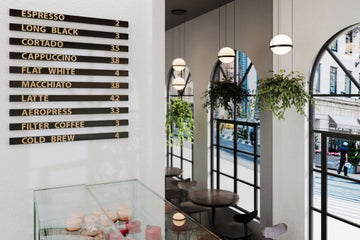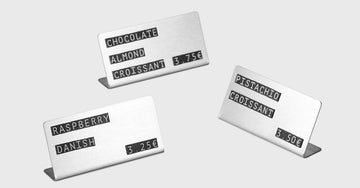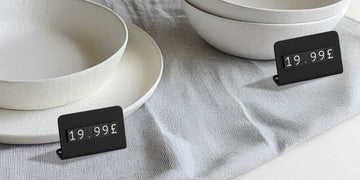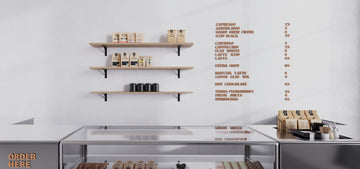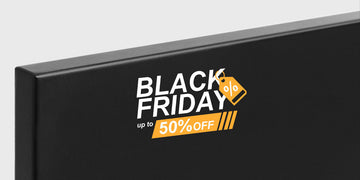In the competitive world of cafes, restaurants, and retail stores, functional decor has become not just an aesthetic choice but a powerful tool for attracting customers and enhancing the overall experience. One of the key areas where functional decor shines is in easily changeable menus, price tags, signage, and holders. These elements allow businesses to quickly adapt, communicate effectively, and create a dynamic environment that leaves a lasting impression on customers.
1. Increasing Flexibility and Speed of Updates
One of the main advantages of using adaptive decor, such as changeable menus and price tags, is the ease with which updates can be made. For cafes, restaurants, or stores, prices, promotions, and menus can change frequently. Seasonal dishes, limited-time offers, and discounts can be quickly announced using these adaptive solutions, allowing businesses to effortlessly convey relevant and up-to-date information to customers. This rapid adaptation ensures that customers always receive the latest data, fostering trust and encouraging repeat visits.
For example, a magnetic letter board can be updated daily to showcase special offers or highlight new menu items, while digital displays can underscore the latest promotions at a glance. This flexibility not only saves time but also reduces costs since there’s no need to constantly create new signage or menus.
2. Enhancing Engagement and Interaction with Customers
Customers are attracted to spaces that look dynamic and personalized. Changeable decor adds an element of novelty that can catch customers' attention and encourage interaction. For instance, a store can use a magnetic writing board to highlight daily specials or emphasize local partnerships. Similarly, a restaurant could incorporate interesting seasonal messages or personalized greetings on its boards, creating an engaging experience that resonates with customers.
Interactive displays also provide employees with an easy way to respond to customer inquiries about prices, special items, or ingredients. This seamless interaction significantly contributes to creating a welcoming and attentive atmosphere, which can be a deciding factor for new customers in their decision to return.
3. Improving Visual Appeal and Branding
Functional decor is also a fantastic way to enhance a business's visual appeal and strengthen its brand. Cohesive, well-thought-out decor—such as matching holders, signs, and price tags—contributes to creating an inviting environment that reflects the business's personality. For example, a cozy cafe might use wooden menus and holders to emphasize a warm, handcrafted style, while a minimalist boutique might prefer sleek metal displays.
Customization of these decor elements also allows businesses to adapt their appearance to seasonal themes, holidays, or events, creating a cohesive branded experience that looks professional and personal.
4. Fostering Customer Trust and Convenience
In a bustling environment, customers appreciate the ability to clearly see prices and product descriptions. Functional decor elements, such as well-placed price tags or holders displaying menus, can prevent confusion and eliminate the need for customers to ask basic questions. When they can quickly find the information they need, customers feel more at ease, leading to a smoother and more enjoyable experience.
Moreover, when these displays are regularly updated to reflect changes, customers gain confidence in the transparency and reliability of the business. For example, if a customer sees that the menu board is updated daily, they are more likely to trust the freshness of the offered items. Thus, functional decor not only informs but also reassures.
5. Cost-Effective Solutions for Small Businesses
For small businesses, changeable functional decor offers a highly effective way to remain relevant and professional. Physical decor elements, such as magnetic boards with changeable letters, are reusable and can be adapted to various needs over time. This flexibility allows businesses to maximize the impact of their decor without the constant investment in new signage or branding materials.
Furthermore, these reusable decor elements are easy to maintain and often made from durable materials, making them a sustainable option for businesses looking to reduce waste. Customization of these decor elements also enables businesses to tailor their appearance to seasonal themes, holidays, or events, creating a cohesive, branded impression that looks both professional and personal.
Conclusion: A Simple Way to Enhance Customer Experience
In today’s fast-paced environment, small businesses that can quickly adapt to customer preferences and market trends hold a clear advantage. Functional decor—especially in the form of changeable menus, price tags, and signage—offers a simple yet effective way for cafes, restaurants, and stores to stay relevant, engage customers, and create a cohesive branded experience. By investing in decor that combines flexibility, functionality, and aesthetics, businesses can enhance customer engagement, build trust, and provide an unforgettable experience that encourages customers to return and share content on social media, ultimately attracting new customers.
Whether you are just starting or looking for ways to refresh your space, functional decor from NOKU can be a strategic asset that contributes to both the appearance and success of your business.
